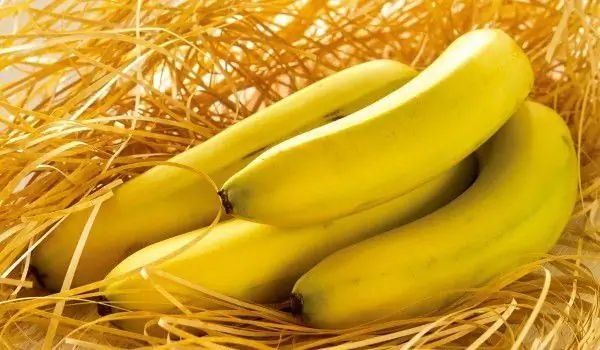2025 Author: Jasmine Walkman | [email protected]. Last modified: 2025-01-23 10:18
Bananas are tree-like plants, although they are practically herbaceous. The name banana is usedto denote the elongated fruits of the plant. Each banana, in addition to having a protective peel on the outside, has small skins on the inside, which are separated in the form of strips. Once peeled, the banana continues to ripen - a property that each of us is convinced.
History of bananas
Bananas are one of the most ancient cultivated plants by man. Its homeland is considered to be the Malay Archipelago, where the population used it for food that complemented the fish diet. A number of wild banana varieties can still be found today in Papua New Guinea, the Philippines and Malaysia. Archaeological traces found in New Guinea show that bananas have been cultivated as early as 5000 BC. Bananas are likely to have been cultivated later in areas of Southeast Asia. It is believed that Southeast Asia is the homeland of delicious bananas.
Banana plantations have been established in China since the beginning of the 3rd century. The Roman writer Pliny the Elder describes how Alexander the Great tasted bananas for the first time in the valleys of India in 327 BC. The chronicler claims that it was the great warrior who brought the plant to Europe.
There is speculation that bananas were known even before the Europeans arrived in these lands. In the 15th and 16th centuries, Portuguese colonizers began growing bananas on plantations in parts of Brazil, West Africa, and islands in the Atlantic Ocean. During the Victorian era bananas are not popular in Europe, although they have already been imported. Already in the early 20th century, bananas became the subject of global trade, grown in many places, but the largest share of production is South and Central America.

Composition of bananas
One banana contains: 86 calories, 1 g protein, 3 g dietary fiber, 26.9 g carbohydrates, 467 milligrams potassium, as well as magnesium, phosphorus, selenium, iron, vitamin A, C, B1, B2, B6, D, PP folate, niacin and other nutrients so important for the human body.
Bananas are an absolute record holder in terms of potassium content. Bananas contain starch, proteins, volatile substances, sugars (mostly sucrose), beta carotene, pectin, fiber, enzymes.
Selection and storage of bananas
Consumption of unripe bananas is harmful and can lead to disorders and other digestive problems. For this reason, when choosing fruit, look for well-ripened fruits that have very light brown spots on the skin. These small spots indicate that the banana is ripe, but when they are too large and brown indicate the opposite - the fruit is too overripe.
Store bananas at room temperature, outdoors if they are not ripe. They can then be placed in the refrigerator, where their skin darkens significantly, but the fruit retains its properties. If you want unripe bananas to ripen faster, put them in a paper bag with avocado.

Bananas in cooking
Bananas are an extremely tasty fruit, which is consumed mainly raw. However, they are not only eaten raw. In China, for example, they make incredibly delicious fried bananas, in Venezuela they make banana rice with parsley and black pepper, and Africans put bananas in almost all their dishes - porridge, omelets, and even in tomato soup. Banana beer is brewed in Uganda.
Bananas are a great addition of many cakes and pastries, they serve as decoration and are part of many creams. Banana is used to make delicious shakes. The taste of this fruit is perfectly complemented by ice cream, milk and a number of other fruits.
With bananas you can prepare cream with bananas, cake with bananas, brownies with bananas, tart with bananas, crumble with bananas, cheesecake with bananas, katmi with bananas, cake with bananas, milk with bananas.
Benefits of bananas
Bananas contain three natural sugars - sucrose, fructose and glucose, combined with fiber. Consumption of bananas gives an instant, sustainable and significant boost of energy. Studies show that eating just two bananas can provide enough energy for a strenuous 90-minute workout.
Bananas can help overcome or prevent a significant number of diseases and conditions.
Depression: Bananas contain tryptophan, one of the twenty common "amino acids" that make all the proteins that the body converts into serotonin, which relaxes, improves mood and generally creates a feeling of happiness.
Postmenstrual syndrome: The vitamin B6 contained in bananas regulates blood sugar levels, which can affect mood.

Anemia: The high iron content in bananas can stimulate the production of hemoglobin in the blood and thus helps with anemia.
Blood Pressure: This unique tropical fruit is extremely rich in potassium, low in salt, making it ideal to beat high blood pressure.
Brain power: Studies show that potassium-containing fruits can support brain activity.
Constipation: The high fiber content of bananas can help restore normal bowel function.
Hangover: Bananas soothe the stomach and increase blood sugar levels, which helps deal with hangovers.
Acids: Bananas have a natural anti-acid effect in the body.
Morning sickness: Eating bananas between meals helps maintain blood sugar levels and avoid morning sickness.
Nerves: Bananas are high in vitamin B, which helps calm the nervous system.
Ulcers: Bananas are used as dietary foods against intestinal disorders due to their soft texture and smoothness. They are the only raw fruits that can be consumed without problems in cases of chronic ulcers. They also neutralize excessive acidity and reduce irritation in the lining of the stomach.
Temperature control: Bananas are fruits that can lower both the physical and emotional temperature of expectant mothers.
Seasonal emotional disorder: Bananas can help sufferers because they contain natural ingredients to improve mood such as the hormone of happiness - tryptophan.
Fight against smoking: Bananas can also help people who are trying to quit smoking. Bananas contain vitamins B6, B12, as well as potassium and magnesium, help the body recover from the destructive effects of nicotine.
Stress: Potassium is a vital mineral that helps normalize heart rate, sends oxygen to the brain and the body regulates water balance.
Risk of stroke: Bananas, as part of a regular diet, can reduce the risk of heart attack by nearly 40%.
Harm from bananas

Like almost any food, bananas pose certain health risks. Two types are known allergies to bananas. The first is related to the so-called oral allergic syndrome, causing itching and swelling in the mouth and throat about an hour after eating the fruit. The second is related to latex allergy and causes urticaria and manifestations of serious gastrointestinal diseases.
Another serious potential risk of consumption of bananas is the increase in glucose levels in the body, which makes them unsuitable for diabetics and people with high blood sugar. This does not mean that diabetics can not eat bananas at all, but rather should be careful with their amount.
Bananas can cause bloating and stomach discomfort if consumed on an empty stomach. It is best to eat an hour after lunch or dinner and never on an empty stomach.
If you have a more sensitive stomach, never eat green bananas, because they cause additional irritation and discomfort. Choose only well-ripened bananas and do not consume more than 1 per day to avoid constipation.
Recommended:
Properties And Benefits Of Bananas

The banana has the fame of one of the most delicious exotic fruits and is used in countless banana recipes. In addition to its natural state, it is consumed in heat-treated, pureed and often in combination with other food products. In addition to taste, bananas also have useful healing and nutritional properties.
For The Healing And Beneficial Properties Of Bananas

Do you remember the time when in the New Year we lined up in a long, long queue for bananas ? And in which family were certain kilograms of the tropical fruit laid? This time is long gone and bananas are now available to everyone. But this is not their main advantage.
Nutritional Value And Benefits Of Bananas

Bananas are sweet fruits that are preferred by many people. They contain many vitamins, a rich source of calcium, phosphorus, iron and sodium, but most of all potassium. Potassium is needed for muscles, heart, brain, bones and liver. It helps to quickly remove excess fluids from the body.
11 Health Benefits Of Bananas

Bananas are extremely useful and delicious. They contain essential nutrients and are very good for digestion, heart, and in addition with their help you can lose weight. Bananas are also very nutritious and are a favorite breakfast. Here are 11 health benefits of bananas proven by science:
Useful Properties Of Bananas - What We Need To Know

Bananas are one of the most common and consumed tropical fruits in the world. They are a satisfying and healthy food that provides us with wonderful nutrients, vitamins and minerals and provides us with a large dose of energy. Bananas are low in calories, fat, sodium and cholesterol, making them suitable for any meal.

